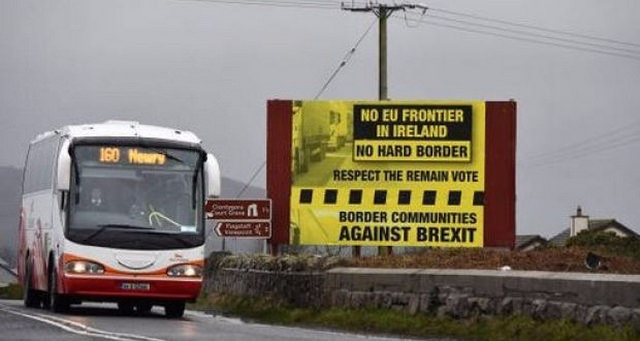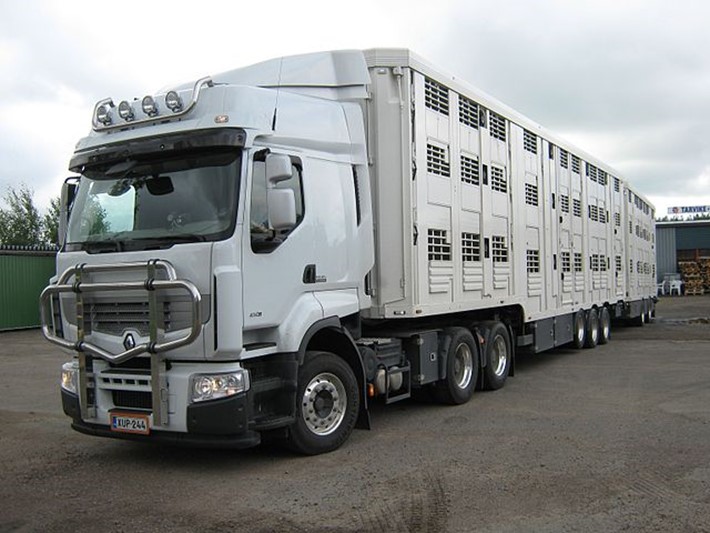



Will Ireland’s meat sector survive a hard Brexit?
With continued uncertainty over Brexit, worries over hard borders and trade tariffs are becoming more apparent. Eoin Mccarthy speaks to livestock producers in Ireland about their concerns for the future and how hard borders could drastically impact upon their businessesTwo years after Britain voted to leave the European Union, uncertainty remains. While negotiations between the UK government, the European Union and the Irish government continue with little apparent progress towards an agreement, the danger of a hard Brexit lingers – and that would be detrimental for Ireland’s agri-food sector.

Concerns rise as a hard border deal looms ever closer for Irish citizens. Image: Denis Bradley
The UK is Ireland’s largest single trading partner for the agri-food sector. In 2016 agri-food exports to the UK totalled €4.8 billion, while the UK was the main market for Irish pig meat, taking 56 percent of Irish total exports.
In the event of a hard Brexit, Irish agri exports to the UK would be subject to World Trade Organisation (WTO) tariffs.
Speaking on RTE’s current affairs programme Prime Time, John Jordan, CEO of Ornua, the Irish dairy board, claimed that WTO tariffs would keep us “awake at night” and that “they would be extremely penal for Irish dairy, for Irish food and agriculture, and make us extremely uncompetitive in the UK market.”
Brexit, and a potential hard Brexit, is causing severe concern among Irish farmers, especially farmers in the border counties of Cavan and Monaghan. To find out how Brexit is likely to affect farmers living in this region, I spoke to Irish Cattle & Sheep Farmers’ Association (ICSA) national beef chairman Edmund Graham who farms in Monaghan.
Although Brexit has not affected his beef enterprise so far, Graham is worried about the future as he does business with companies in Northern Ireland and this could potentially end if a hard border between the North and the Republic of Ireland is reintroduced.
“It’s the worry of what is going to happen is the problem,” says Graham. “I would do business with people in Northern Ireland; I would get feed from Northern Ireland and that is still going ahead, but there is a worry there that it might not happen if they bring in the border again.
“In the last number of years all my feeds have come from Northern Ireland. I deal with a big feed merchant in Belfast and I sourced all of my feeds off of them for maybe the last 10 years. I don’t know what would happen if Brexit comes along: would I still be able to do business with them or not? Or would they want to do business with me?”
Despite this, Graham is more concerned about trade between Ireland and the UK mainland than free and open access to Northern Ireland, and this is due to Ireland’s reliance on the UK market for agri-food exports.
“The biggest concern for me is exports into the UK,” he says. “In Ireland we export nearly half of all our beef into the UK, the other half around the world. Somewhat in the region of 200,000 tonnes of beef goes into the UK every year and if that market was closed down because of tariffs or EU regulations that would have a major impact.”
The reintroduction of a hard border for Northern Ireland would have other serious implications for farmers and agri-business.
“One of the bigger issues along the border is farmers maybe having different parcels of land dotted on both sides of the border, and they might have to travel into Northern Ireland and then back out into the South to access land or vice versa. And if a border goes up, that will leave it very difficult to manage those farm lands in terms of transportation of stock”
Graham also alluded to how the prospect of a hard Brexit and a hard border would have implications for the local dairy co-operative LacPatrick, which was formed in 2015 when Town of Monaghan Co-Op and Ballyrashane Co-Op merged.
“We live quite close to Monaghan town. LacPatrick co-op, they have a lot of suppliers in Northern Ireland – will these suppliers be fit to transfer their milk?
“LacPatrick did a calculation last year that 16,000 lorries a year crossed the border drawing milk to and from different farmers. There are a whole lot of different scenarios that will affect everybody down the line.”

Millions of lorries cross the border every year meaning border tariffs could cost the industry a great deal. Image: Esa
It is difficult to measure how Brexit will affect his business in the future and he acknowledged that farmers will be better able to plan once a deal has been negotiated and they know exactly what restrictions are in place.
“It all boils down to what restrictions are imposed – that’s the biggest thing,” says Graham. “If we knew what restrictions are going to be imposed, be it trade tariffs or will they introduce customs at the border… Hopefully some kind of a deal can be worked out where there will be no restrictions. But until we know exactly what is happening it’s very hard to say what the implications are for farmers.”
Graham highlights how important access in and out of Northern Ireland is to his operation, especially when he does business with companies in County Donegal, which is the northernmost Irish county and is part of the Republic, located to the west of Northern Ireland.
“I do business with a man up in Donegal. I would buy stock from him and they would travel from Monaghan up through Northern Ireland and back into the south into Donegal. That might not be possible now if they would bring in the border and put up controls, because then my cattle could not travel into Northern Ireland and travel back out again into the South – so that would have a major implication on my business.”
Graham says that the majority of people who live in the border counties definitely do not want the reintroduction of border restrictions; he himself would like things to carry on as normal, but after Brexit that will depend on the controls put in place by the European Union and UK.
Today, he says, “Going across the border you do not even know where the border is apart from a change in the road signs. There is free movement and we all would like that to stay.
“We have relatively easy access to travel between North and South at the minute, hopefully that could stay in place rather than having to go through customs and have paperwork. In my eyes the sooner they can make decisions on what is going to happen [the better] – people can then work towards what the changes might be. But,” he concludes, “when everything is in limbo it’s very hard to get an understanding of what might happen.”
By Eoin Mccarthy







